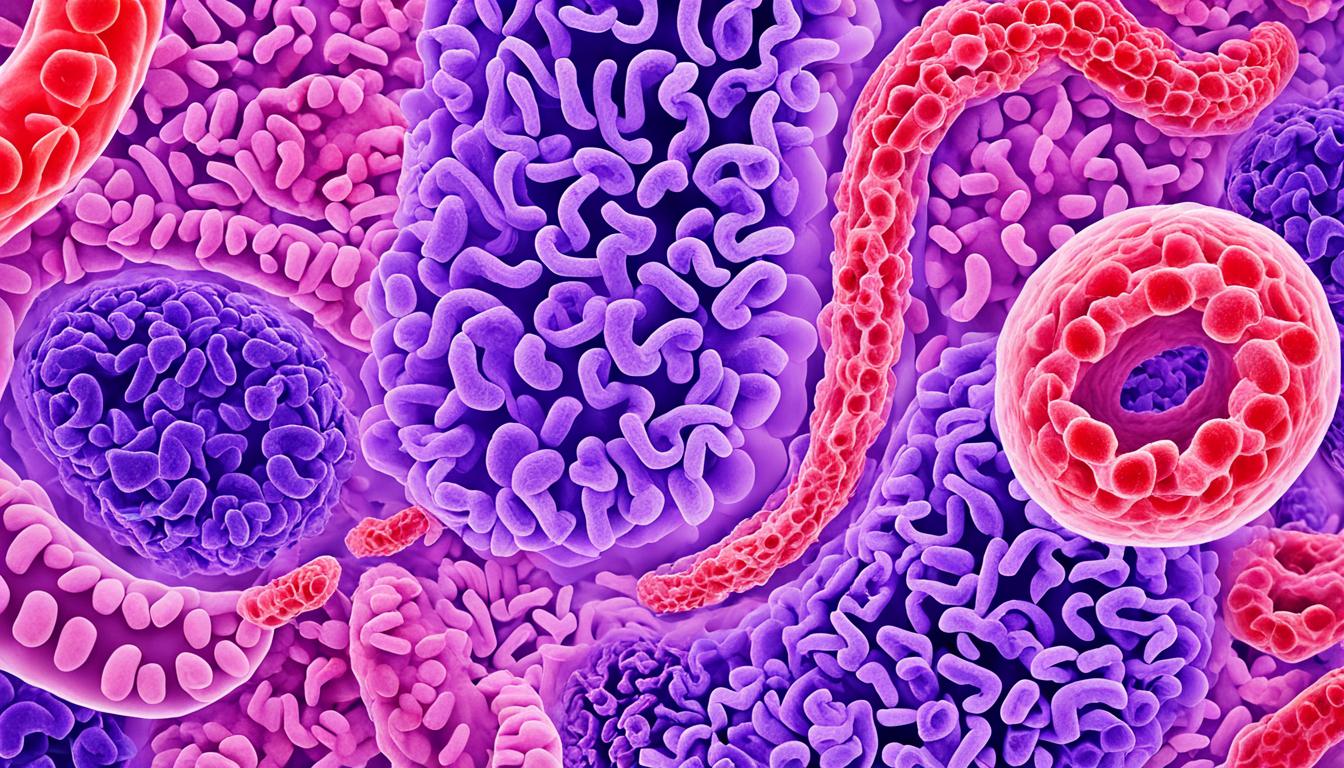Ulcerative colitis is a chronic disease in the inflammatory bowel disease (IBD) group. It affects around 1.6 million people worldwide, mainly those aged 15 to 30 years.
The exact reason for ulcerative colitis is not known. It’s thought to be linked to the immune system attacking the colon’s healthy lining. This causes inflammation and unpleasant symptoms.
Those with ulcerative colitis may have bloody diarrhea, stomach pain, and lose weight. They might feel tired all the time and not want to eat. The illness can happen suddenly, making life hard.
Treating ulcerative colitis aims to control symptoms and have times without any symptoms. Doctors often use anti-inflammatory drugs, immunosuppressants, healthy eating, and stress management. But, these can have side effects and not work for everyone.
Because current treatments have limits, some look for new options like stem cell therapy. It uses mesenchymal stem cells (MSCs) to help reduce inflammation and repair the colon’s lining. This approach has shown some good results.
Key Takeaways:
- Ulcerative colitis is a chronic inflammatory bowel disease affecting the colon.
- Common symptoms include bloody diarrhea, abdominal pain, weight loss, fatigue, and decreased appetite.
- Treatment primarily focuses on managing symptoms through medication and lifestyle changes.
- Stem cell therapy, using mesenchymal stem cells, shows promise as an alternative treatment option.
- Further research is needed to determine the long-term effectiveness of stem cell therapy for ulcerative colitis.
Ulcerative colitis: Causes, Diagnosis, and Symptoms
The exact causes of ulcerative colitis are not fully understood. It seems to be connected to both genes and the environment. If someone in your family has this condition, you might be more likely to get it too.
The main sign is bloody diarrhea. You might also feel pain in your stomach, lose weight, be tired, and not feel like eating. Other signs can be joint pain, rashes on your skin, and ulcers in your mouth.
Diagnosing ulcerative colitis means using many tests. You’ll have blood and stool tests to check for signs of the disease. Doctors also do exams like a colonoscopy to see inside your gut and take small samples for more tests.
Common Symptoms of Ulcerative Colitis:
- Bloody diarrhea
- Abdominal pain
- Weight loss
- Fatigue
- Decreased appetite
- Joint pain
- Skin rashes
- Mouth ulcers
Not everyone has the same symptoms or the same bad days. Some people might not feel very sick, while others have tough times. Getting the right diagnosis and care is key for dealing with this disease.
After looking at the treatment choices, we’ll see what can help with ulcerative colitis. This includes medicine, changes to your life, and new treatments like stem cell therapy.
Treatment Options for Ulcerative Colitis
The goal in treating ulcerative colitis is to lessen inflammation, ease symptoms, and reach a stage where symptoms are much less. Doctors have many tools to fight this ongoing disease. These tools include medicines, changes in what you eat, and in some tough cases, surgery.
Medication-Based Treatments
Anti-inflammatory drugs serve as a key part of the treatment for this condition. Medicines like mesalamine help calm down swelling in the colon and make symptoms better. For quick relief during flare-ups, doctors might use corticosteroids. These drugs aim to calm the immune system down, easing inflammation with drugs like prednisone.
Immune System Regulators
If the disease keeps coming back, doctors may turn to medicines that lower the immune system’s activity. These drugs include azathioprine or methotrexate. They aim to cut back on inflammation by quieting the immune system.
Lifestyle Modifications
Medicines are not the only answer. Making changes in what you eat and how you live can also make a big difference. Eating based on a plan for ulcerative colitis can cut down on symptoms and keep flare-ups at bay. This might involve staying away from foods that cause problems, like dairy or spicy dishes. Often, shifting to a diet that’s easier on the gut helps a lot.
Lowering stress can also help keep the disease from acting up. Practices like yoga or talking with a professional can be very useful. These methods are good for calming the body, even when you’re not feeling well.
Surgical Intervention
When nothing else seems to work, surgery might be the next step. Surgery is usually a colectomy, which means taking out the sick part of the colon. This surgery is meant to give a long break from symptoms and lower the chances of symptoms coming back. Remember, surgery is the last option when everything else has been tried.
The treatment of ulcerative colitis pulls from many areas. Each plan is tailored to the person, taking into account how bad their symptoms are, what they’ve tried before, and their overall health. Teamwork between patients and their healthcare team is key to finding the best plan.
Stem Cell Therapy for Ulcerative Colitis: A Promising Treatment Approach
Stem cell therapy, using mesenchymal stems cells (MSCs), is a hopeful treatment for ulcerative colitis. These cells have features that can decrease inflammation and boost the healing of the colon. Studies have found that MSC therapy works better than usual treatments for colitis.
The success of this therapy has been seen in both animals and humans, with very few side effects. To perform this therapy, doctors take MSCs from the patient’s bone marrow, fat, or blood. Then, they put these cells back into the person either all over the body or in specific places. This approach could better symptoms, the look of the intestines, and how patients feel.
Even though this treatment looks promising, more research is necessary to confirm its benefits and long-term results. Studies are trying to find the best dose, when to give the therapy, and the best way to deliver the cells. By learning more about this new way of treatment, we might make lives better for those with ulcerative colitis everywhere.

